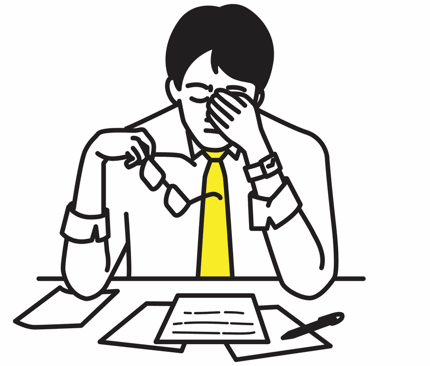Take a Few Deep Breaths
It's the first thing someone tells you to do, but for good reason. Deep breathing allows the brain to receive a quick, extra dose of oxygen. "When your body is anxious, the balance of oxygen and carbon dioxide is off," says Daniel Smith, author of the acclaimed Monkey Mind: A Memoir of Anxiety. He suggests breathing in through your nose for four counts, then exhaling slowly through your mouth for six counts. "That balances the gaps in your bloodstream to help you relax."
Grab Your Ears
A little self-acupressure goes a long way. Take your thumb and index finger and lightly pinch your earlobes. Press and roll the earlobes for several seconds. Pull them slightly away from your head and move them in small circles ten times. The motion moves the head's tentorium membrane, which has a stress-relieving and pain-reducing effect. But it can look a bit silly, tugging at your ears, so make sure to do this in private--a bathroom stall makes a nice place.
Chew Some Gum
When you're feeling stressed or anxious, pop a piece of gum into your mouth and start chewing. Studies have shown that the action of chewing gum (and particularly passionate chewing) has the ability to reduce fatigue, stress, and anxiety, and even boost your mood as well as your job performance. Another study determined that chewing gum actually reduced various stress-related responses in the brain.
Visualize Your "Happy Place"
An easy way to momentary escape a stressful situation or anytime you're feeling irritated or anxious. Simply close your eyes and think about a place you'd love to be—call it your happy place. Maybe it's a beach, a vineyard in Napa Valley or a cabin in the woods. The key, according to experts at the Mayo Clinic, is to incorporate as many senses as you can, including smell, sight, sound and touch. If you imagine relaxing at the ocean, for instance, think about the smell of salt water, the sound of crashing waves and birds in the distance ... think about the warmth of the sun on your body.
Make a Schedule
The more out of control you feel, the more stressed out you'll be. If the boss drops a huge project in your lap, work up an outline of your duties and schedule when things need to be done. What was once immense is now a set of manageable tasks. Do the same for your weekly obligations and responsibilities under control and take pride in crossing each item off your to-do list.
Count ... Backwards
You know how people will tell a hot-headed guy to "calm down and count to ten"? That's because counting numbers gives your mind something neutral to focus on, instead of whatever is causing you to get upset. But there's a more effective way to use counting to relax yourself. When you're getting stressed or agitated, count backwards. Start at a number, 30 for example, and count backwards to one. You can even imagine yourself in an elevator, slowly descending to the first floor. As you feel yourself lowering down to the ground, your heart rate will slow and you'll feel more mellow.




